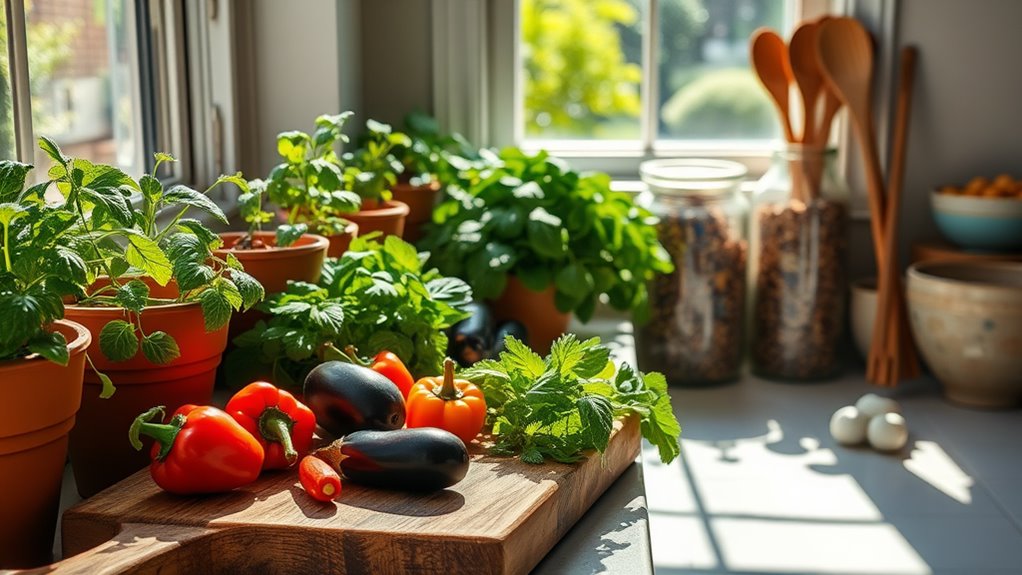You’ll Be Surprised How Easy It Is to Start With Plant-Based Home Tips
You might be surprised at how simple it is to incorporate plant-based home tips into your daily routine. By making a few thoughtful changes, like stocking up on whole grains and legumes or swapping out plastic for glass, you can create a healthier living environment. These small adjustments not only promote sustainability but can also enhance your overall well-being. Curious about how to get started with these practical shifts?
Key Takeaways
- Stock your pantry with whole grains, legumes, nuts, and seeds for easy and nutritious plant-based meals.
- Invest in essential kitchen tools like a high-speed blender and food processor to streamline cooking.
- Incorporate fresh herbs and spices to enhance flavors in your plant-based dishes effortlessly.
- Implement simple swaps, like using glass containers and reusable cloths, to create a greener kitchen environment.
- Practice mindful consumption by planning meals and creatively using leftovers to reduce food waste.
Embrace Plant-Based Cooking Essentials
How can you transform your kitchen into a plant-based haven?
Start by stocking up on essential ingredients like whole grains, legumes, nuts, and seeds. These staples are versatile and nutritious, making meal prep a breeze. Invest in quality kitchen tools such as a high-speed blender, food processor, and sharp knives to simplify cooking. Don’t forget fresh herbs and spices for flavor; they’ll elevate any dish. Keep your pantry organized, so you can easily access your plant-based staples. Incorporating plant-based staples into your diet can lead to improved health and well-being. Following these plant-based home tips won’t only enhance your cooking experience but also inspire healthier eating habits that benefit you and the planet.
Simple Swaps for a Greener Kitchen
While transitioning to a greener kitchen might seem daunting, making simple swaps can significantly reduce your environmental impact. Start by replacing plastic storage containers with glass ones, and swap disposable paper towels for reusable cloths. These small changes can lead to a more sustainable lifestyle. Implementing these swaps can also result in long-term cost savings and enhance your overall kitchen experience.
| Swap | Benefit |
|---|---|
| Plastic containers | Reduces plastic waste |
| Paper towels | Saves trees and energy |
| Non-organic produce | Supports local farmers and health |
Implementing these swaps doesn’t just help the planet; it enhances your kitchen experience too. Enjoy a cleaner, greener cooking space!
Eco-Friendly Cleaning Alternatives
Making eco-friendly choices in your kitchen goes beyond food storage and preparation; it extends to your cleaning routine as well.
Swap conventional cleaners for simple, plant-based alternatives.
For instance, mix vinegar and water for an all-purpose cleaner that tackles grime without harsh chemicals. Baking soda works wonders as a gentle abrasive for scrubbing surfaces. You can also use essential oils, like tea tree or lemon, for natural antibacterial properties and a fresh scent. These homemade cleaners not only reduce waste but also promote a healthier environment.
Embrace these alternatives, and you’ll find cleaning can be effective, safe, and eco-friendly.
Sustainable Gardening Practices
Why not transform your garden into a sustainable oasis? Start by using native plants that require less water and attract local wildlife. Composting kitchen scraps enriches your soil, while companion planting can naturally deter pests. Here’s a quick guide to sustainable practices:
| Practice | Benefits | Tips |
|---|---|---|
| Native Plants | Low maintenance | Research local species |
| Composting | Reduces waste | Use a mix of greens and browns |
| Companion Planting | Pest control | Pair herbs with vegetables |
Implement these practices, and you’ll enjoy a thriving garden that’s both beautiful and eco-friendly! Additionally, consider incorporating healthy plants into your garden, as they can significantly enhance your harvest.
Mindful Consumption and Waste Reduction
How can you make a meaningful impact on the environment through your everyday choices?
Start by practicing mindful consumption.
Before purchasing, ask yourself if you truly need the item. Opt for products with minimal packaging and choose reusable items when possible.
At home, reduce food waste by planning meals and using leftovers creatively. Composting scraps can also enrich your garden.
Don’t forget to recycle properly; familiarize yourself with local guidelines.
Lastly, support eco-friendly brands committed to sustainability. Adopting zero waste practices can significantly reduce your household’s environmental footprint.

